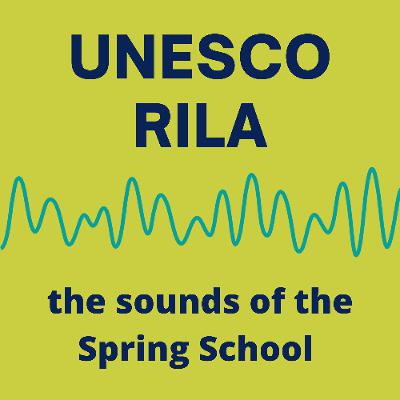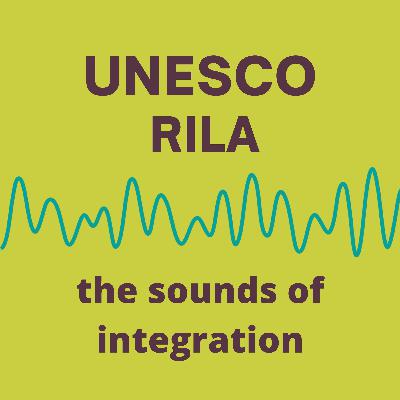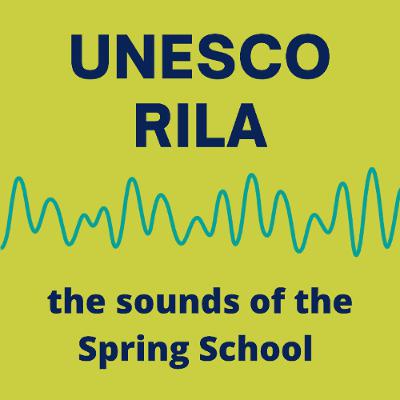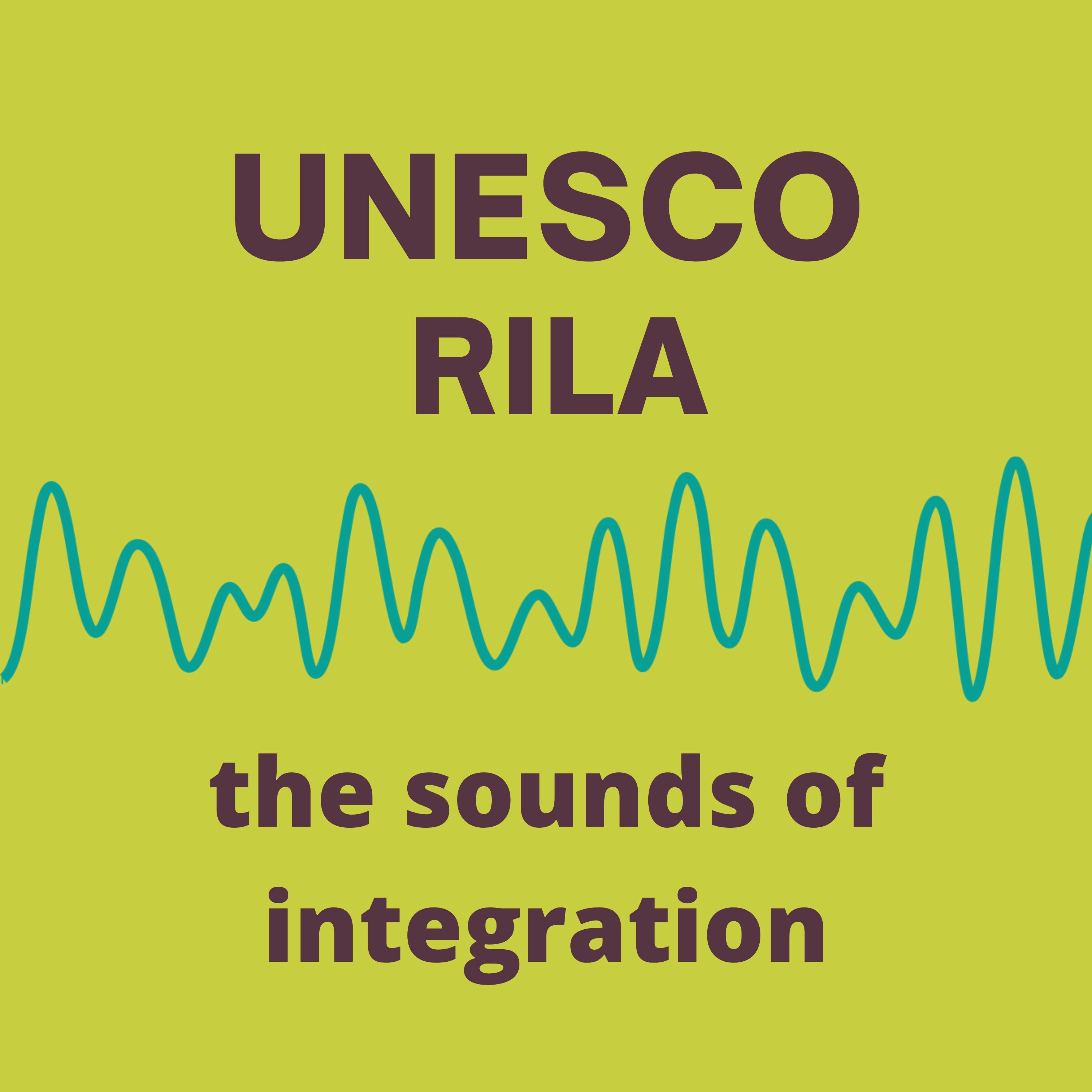Discover UNESCO RIELA: The sounds of integration
UNESCO RIELA: The sounds of integration

UNESCO RIELA: The sounds of integration
Author: UNESCO RIELA
Subscribed: 3Played: 49Subscribe
Share
© All rights reserved
Description
Welcome to the podcast series of the UNESCO Chair on Refugee Integration through Education, Languages, and Arts (RIELA) at the University of Glasgow.
We bring you sounds to make you think about integration, languages, culture, society and identity. A collection of academic musings, poetry, lesser heard voices and personal stories for you to enjoy and expand you horizons with. In short: a podcast for everyone with stories from the world, about the world, released fortnightly.
We work in collaboration with Glasgow Refugee, Asylum and Migration Network (GRAMNet) and its partners. Together, our aim is to promote creative, practical multilingual action for change at all levels of society to build capacity in research and action focused on fostering cultural expressions of heritage and diversity with displaced peoples, and academic freedom for those at risk.
Please subscribe to get notified of new episodes coming out! Full show notes can be found on the University of Glasgow's UNESCO RIELA pages: bit.ly/thesoundsofintegration
We bring you sounds to make you think about integration, languages, culture, society and identity. A collection of academic musings, poetry, lesser heard voices and personal stories for you to enjoy and expand you horizons with. In short: a podcast for everyone with stories from the world, about the world, released fortnightly.
We work in collaboration with Glasgow Refugee, Asylum and Migration Network (GRAMNet) and its partners. Together, our aim is to promote creative, practical multilingual action for change at all levels of society to build capacity in research and action focused on fostering cultural expressions of heritage and diversity with displaced peoples, and academic freedom for those at risk.
Please subscribe to get notified of new episodes coming out! Full show notes can be found on the University of Glasgow's UNESCO RIELA pages: bit.ly/thesoundsofintegration
86 Episodes
Reverse
Timothy Peacock and Rebecca Sutton talk about peacegaming and their work at the Games and Gaming Lab at the University of Glasgow. This talk was inspired by their workshop at the UNESCO RIELA Spring School: The Arts of Integrating (May Peace Prevail), which took place in Glasgow in May 2025.
In this episode, Julie Ward, former MEP with a background in activism, talks about the Durham-based 'No To Hassockfield' campaign. Hassockfield is the site of an Immigration Removal Centre and the campaign was fighting for its closure, uses creative arts as a powerful tool to raise awareness of the harms caused by asylum detention and the need to provide community alternatives, whilst also providing a culture of care for the campaigners.
This presentation was recorded at the UNESCO RIELA Spring School: The Arts of Integrating 2025. This event gets hosted annually in person in Glasgow, Scotland in May and online in October. The next edition is due on 27-31 October 2025.
For the full show notes, please visit bit.ly/thesoundsofintegration
This episode is a recording of the opening keynote address Prof David Gramling delivered at the UNESCO RIELA Spring School: The Arts of Integrating 2025, in Glasgow, Scotland. Here is the abstract:
Good News
Bernice Johnson Reagon once sang for us a corrective teaching, along the lines that: “It’s ‘good news’ when you reject things as they are. […] And they don’t say ‘it’s good times’, they say ‘it’s good news’.” Fifty years later, these are definitely not good times. And, in this powerfully strange moment, even looking around for ‘good news’ often feels inappropriately consolational, often at fatal odds with the dreads and taunts of today’s geopolitical realism. This opening talk for our Spring School welcomes in the resources of “untimely optimism” (Feldman 2023), “out-of-phasedness” (Doumani 2007), “gramáticas de lo inaudito” (Acosta López 2023) and “anticipatory illuminations” (Bloch in Zipes 2019), in hopes of making room for a peace-in-this-time whose living vitality is the opposite of resigned quietism. To that end, we will meet head-on a few of the nightmares-of-the-self that may well haunt a peace-lover in Spring of 2025, seeking to expel that haunt and conjure in its place some unprecedented good news.
For the full show notes, including David's biography, please visit bit.ly/thesoundsofintegration
In this episode, Elder in Residence Mike Gonzalez interviews Mohammad Alkhatib and Daniel Calvert about teaching languages, inclusion, second language acquisition, ESOL, linguistic landscapes and translanguaging pedagogy. Please visit our website for the shownotes, including their biographies: https://bit.ly/thesoundsofintegration
In this little bonus clip, you'll hear from a number of participants about their experiences at the UNESCO RIELA Spring School: The Arts of Integrating. The music is by Soloway Choir, a choir made up of Ukrainian women, currently living in Glasgow.
In this episode, Dr Tawona Sitholé speaks with academic and author Jo Beall (FAcSS) about her debut novel, Meadowlands Dawn, set in apartheid South Africa during the 1980s. Their conversation explores Jo’s personal connection to the story, how she switched from academic to creative writing, and the important distinction between love and infatuation.
For the full show notes, including biographies of the speakers, please visit bit.ly/thesoundsofintegration
A wee bonus message for you all. Full show notes, including the names of the speakers and the languages: bit.ly/thesoundsofintegration
This week we have an episode in a different language for you. Listen to TafBob Mutumbi, telling us a story in Shona, one of the languages spoken in Zimbabwe by around 9 million people.
Tafadzwa Bob Mutumbi is an actor, Director and Theatre maker from Harare, Zimbabwe.
TafBob strives to create, perform and direct provocative ritual theatre pieces that are innovative and functional. He is committed to using his craft and artistic voice to tell marginalised African narratives with the express intention of bringing about social and political transformation. A graduate of the Theory X Theatre Initiative's 3 year acting programme, Harare, Zimbabwe, 2011. And the Dell'Arte International School of Physical Theatre's MFA programme, Blue Lake, CA, USA, 2017.
He has performed in plays such as "The Convert" by Danai Gurira, "The Gospel of Othello" by Patrice Naiambana. "Broken" co created and performed with Everyone Ndlovu.
He is the inaugural recipient of the Walter Mparutsa artist of excellence fellowship.
His directing credits include the plays ""Ruvajena" By Virginia Jekanyika, My Father is a Goat", (devised.) The music theatre adaptation of The Merchant of Venice" (co-director with Juwon Ongungbe) "Mirror Magnet", (Devised ) "Chirorodziva", written by TafBob "Breathing Graves" (Devised) and "There is a Field" by Jen Marlowe.
He has directed staged readings including "Familiar" by Danai Gurira and "Hashtag Blackgods Matter" By Sfundo Sosibo.
As of 2021, he is working on a duet project exploring the world for ritual theatre for healing of racial and political trauma
- IMDb Mini Biography By: Moyo
In this second episode about the Drawing Together project, Alison Phipps interviews Ravi Kohli, Kate MacKinnon, Sharon McGregor and Christine Uwase about their experiences working on the project. Please refer to part 1 for the full background of the project. For the show notes, including biographies of the speakers and links to the project, please visit: bit.ly/thesoundsofintegration.
Rough timings of this episode's content:
0 to 1m50s: Alison briefly introduces the Drawing Together project and team.
1m50s to 3m40s: Christine talks about her role as project Ambassador and what the project meant to her with Alison’s reflections and questions.
3m40s to 9m30s: Christine and Alison reflect on their involvement in the project and the value person methodology.
9m30s to 16m15s: Ravi reflects on the challenges of running an international project e.g., overcoming language and cultural barriers and the covid-19 pandemic, with Alison’s reflections.
16m25s to 20m25s: Kate reflects on her policy role in the project and the policy context of the project in Scotland.
20m25s to 24m35s: Sharon reflects on some of the project findings in relation to young refugees growing new roots in a new country and the importance of language, cultural, stability, security, with Alison’s reflections.
24m35s to 24m40s: Alison reflects on the project findings in relation to the New Scots Integration Strategy delivery plan.
24m40 to 29m50s: Christine reflects on the challenges young refugees overcome when they are setting up a new life in a new country, with Alison’s reflections.
29m50s to 33m33s: Kate reflects on the policy findings and the importance of relationships, nature, faith, navigation, technology, with Alison’s reflections.
33m33s to 37m20s: Sharon reflects on the research findings in relation to the important features of professional relationships from young refugees in the project, with Alison’s reflections in relation to the New Scots Integration Strategy.
37m20s to 43m25s: Kate reflects on the importance of nature, faith and access to digital technology and travel as noted in the project’s policy brief, and the importance of children’s rights, with Alison’s reflections.
43m25s to 49m39s: Ravi reflects on the personal, cultural and research consequences of the Drawing Together project, with Alison’s reflections in relation to the New Scots Integration Strategy.
49m39s: Closing remarks and Alison’s thanks.
In this episode, Alison Phipps interviews Ravi Kohli, Sharon McGregor and Christine Uwase about the Drawing Together project, a project that looked at the relational wellbeing in the lives of young refugees in Scotland, Finland and Norway. For the full show notes, including biographies of the speakers and links to the project, please visit: bit.ly/thesoundsofintegration.
Rough timings of this episode's content:
0 to 4 mins: Alison introduces the Drawing Together project team
4 to 12 mins: Ravi introduces the project and Alison responds
12 to 17 mins: Sharon reflects on the participants and project methodology and Alison’s reflections and questions
17 to 20 mins: Sharon explains the meaning behind some of the participants’ art objects and Alison’s reflections.
20 to 26.5 mins: Ravi explains the rationale behind past/present/future time dimensions and Alison’s reflections and questions.
26.5 to 28.5mins: Ravi reflects on the ‘past’ time dimension and Alison’s reflections.
28.5 to 30mins: Sharon reflects on the past methodology and Alison’s questions.
30 to 37mins: Christine explains her ambassador role on the project and Alisons’ reflections and questions
37 to 41mins: Christine reflects on the international visit to Norway to meet the Norwegian and Finnish teams and Alison’s response
41 to 43.34mins: Alison’s closing remarks, thanks and invitation for recording a part two.
This episode is a collection of 4 poems, written by the 4 keynote listeners Erdem Avşar, Adrianne Kalfopoulou, Herbert Cea and Heidi Perez-Cordero, who each summarised a day of the UNESCO RIELA Spring School: The Arts of Integrating 2024, a large conference which takes place every year in May in Glasgow. For more information about the event, please visit bit.ly/RILASpring24. For the full show notes, please visit bit.ly/thesoundsofintegration.
This episode is a recording of a session entitled 'Exploring creative, cross-cultural research collaborations: A case study of an MSF run thalassemia clinic in Lebanon', which was meant to take place at the UNESCO RIELA Spring School 2023, but which was cancelled because of the situation in Lebanon at the time. Dr Molly Gilmour has now kindly shared the research that she conducted, together with her colleagues Belal Shukair, Fatima Fouad and Nader Tabri.
For the full show notes, including bios of the speakers, the presentation slides and images of the project, please visit https://bit.ly/thesoundsofintegration
In this episode, UNESCO RIELA PhD researcher Pinar Aksu discusses her workshop at the RIELA Spring School: The Arts of Integrating 2024 (Word Springs). Pinar's PhD research looks at the connection between art and law in the context of migration and how arts practices can be part of creating social change, as well as access to justice within the immigration system. Her workshop explored the language used to describe migration in headlines, legislation, policies, and by lawyers, and invited participants to bring the language of the law to life - and to create an alternative. For the full show notes, please visit bit.ly/thesoundsofintegration
This episode was recorded at the UNESCO RILA Spring School: The Arts of Integrating 2024 (Word Springs). In it, Michael Quinn argues for the inclusion of stories in teaching, to add a philosophical dimension to traditional fact-based teaching methods. For the full show notes, please visit bit.ly/thesoundsofintegration
This episode was recorded at the UNESCO RILA Spring School: The Arts of Integrating 2024. In it, Gillebrìde Mac'IlleMhaoil / Gilbert MacMillan shares stories from South Uist and surrounding islands, as well as some Gaelic songs. For the full show notes, please visit bit.ly/thesoundsofintegration
Margot Leys Johnston interviews Dr Hyab Yohannes from the UNESCO RILA team about his research into the 'refugee condition'. For the full show notes, including short biographies, please visit bit.ly/thesoundsofintegration
This episode is a rerecording of a session we hosted at the UNESCO RILA Spring School: The Arts of Integrating 2023, hosted by By Nadine Malcolm (Due North Studio), Lee McNeish (University of Edinburgh) and Cáit O'Neill McCullagh (independent artist). "Who Are We Now?" explores the destruction, and subsequent emergence, of culture in the northern Highlands, centred around the concepts of agency and ownership, and how destruction creates space for the new. How does learning about loss help give agency over the destruction of the Highland Clearances, and through that, create space for communities to forge their own present and futures. Asking the question; how has our culture loss and destruction led us to be who we are now, and what does that look like? In the true spirit of the ceilidh, this work by its very nature should be collaborative. Whilst providing a framework, Nadine, Lee and Cáit invite community groups and individuals to reflect creatively on these topics to present a lively and open exploration of modern Highland identity.
For the full show notes, including biographies, please visit bit.ly/thesoundsofintegration
In this episode, James Rann and Katherine Mackinnon from the University of Glasgow introduce their project 'Власними словами | In Our Own Words', which is a project that brings Ukrainians in Glasgow together with other Glaswegians and uses creative writing and multilingual translation to build confidence, community and mutual understanding. For more information about the project and the speakers, please go to the show notes: bit.ly/thesoundsofintegration
This is the second of a two part conversation between Dr Dan Fisher, and researchers Sawsan Abdelghany, and Adam Williamson on their work on ESOL in the asylum system. In this episode, Dan and Adam are interviewing Sawsan.
Sawsan Abdelghany is a postgraduate researcher at the University of Glasgow, and a heritage language tutor. She graduated from the University of Edinburgh with a Masters in TESOL and has worked as an English-Arabic interpreter for asylum seekers and refugees in the Scottish legal system. Her research interests centre around the role of language in helping refugees to integrate.
This is the first of a two part episode in which Dr Dan Fisher talks with Sawsan Abdelghany and Adam Williamson on their work on ESOL interpretation in asylum appeals. In this part, Sawsan and Dan are interviewing Adam.
Adam Williamson is a freelance translator and interpreter based in Paris, where he works with English, Spanish and French. He began his interpreting career in the asylum system in Glasgow, where he encountered a variety of challenging circumstances and ethically compromising situations for which he felt his interpreter training had not fully prepared him. These experiences led him to complete an MPhil by research at the University of Glasgow, under the supervision of the UNESCO RILA team. Chiefly drawing on participant observation and interviews, his study looks at the mismatch between the expectations of interpreters in the asylum context and the reality on the ground. The research also includes a series of recommendations which will feed into the third iteration of the Scottish Government’s New Scots Refugee Integration Strategy.
For the full transcript, please go to https://bit.ly/thesoundsofintegration


















